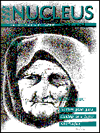In this issue, John Wyatt ('Healing of a Leper') begins a series looking to Jesus the Great Physician- asking how we may imitate him in our professional lives. Jesus' manifesto embraced both suffering and sin, justification and justice (Lk 4:18-19). Here, Lemuel warns us that life without lip is uninterpreted parable. We need to explain the gospel clearly, in the context of this age. Michael Poole (p2) boomerangs the godless gene guru. Dionysius' testimony heralds a change of tack- from ethics to apologetics. Conversely, Theresa Halpin (p23) is spurred to speak out for Christian ethics on local radio.
Yet faith in action cannot be limited to proclamation evangelism, though this has primacy. If works without words lack clarity- then works without words lack credibility. People must see that the gospel we preach has transformed us. The prodigal returns home to salvation; the good samaritan goes out in mission. Visible love gains a hearing for the gospel. Here, Matt Warner ('Azerbaijan') and Geoff Atkinson ('Compassion for the world's suffering') challenge us to convert faith into sacrificial action. Compassion is not merely a bridge to evangelism- it is the obedience required of a transformed people. God has shown us what is good. Are we willing to 'act justly, love mercy and walk humbly with [our] God' (Mi 6:8)?
Each of Nehemiah's builders 'wore his sword at his side while he worked'. The challenge is to acknowledge God in every situation- to fully integrate our professional lives and our Christian faith. God is already as involved in our patients' lives, as in our own. Prayer will have crossed most patients' minds. That in itself is liberating. In conveying the hope we have (1 Pet 3:14-16) we must start where patients are at, and scratch where they are itching. Yet we cannot divorce ourselves from costly entry into their world. God the almighty longs for repentance, cares unceasingly for the needy, and calls for justice. He calls us to be a voice for the voiceless, and defenders of the defenceless. God's worth ethic is not that of the world- or increasingly, of the NHS.
Jesus came alongside people to dirty his hands directly; identifying with their frailty, sorrow and sin- and shunning none. He didn't have to invest the ultimate costly effort in us, but chose to, in love. We stand in the shadow of the cross. Christ, who stood in the gap once and for all, now sends us into the world as his father sent him into the world (Jn 16:33; 17:18).































